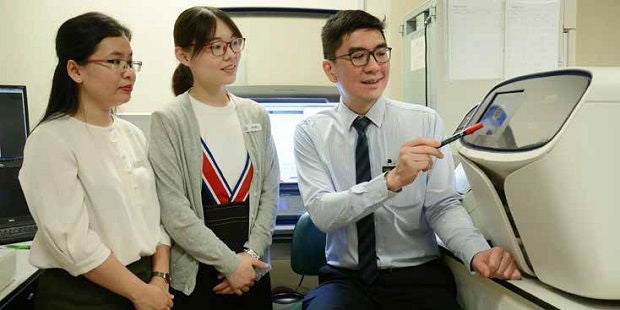
<<(From left) Exchange attachment participants Dr Mary Nheb and Dr Chen Wanwan, with Prof Kenneth Chang in the pathology laboratory.>>
Increased research and the growing knowledge of childhood cancers have led to new tests that diagnose patients more quickly and accurately.
The KK Women’s and Children’s Hospital (KKH) is now able to diagnose tumours more quickly and accurately, leading to better and more precise treatment.
This is thanks to new molecular tests designed by the VIVA-KKH Paediatric Brain and Solid Tumour Programme, a collaboration started in 2015 between KKH, the Singapore-based charity VIVA Foundation for Children with Cancer, and St. Jude Children’s Research Hospital in the United States.
The programme seeks to improve clinical care, and research into brain and solid tumours in children to improve treatment outcomes. A majority of children with these illnesses in Singapore are cared for by KKH. Such rare cancers are difficult to treat and have higher mortality rates compared to blood cancers like leukaemia.
“Previously, without these molecular tests, it was much harder to precisely diagnose these tumours, and patients often had to seek testing at overseas centres. Now, with such advanced in-house capabilities, we can facilitate the allocation of appropriate treatment more efficiently,” said Associate Professor Kenneth Chang, a member of VIVA-KKH programme’s steering committee, and Head and Senior Consultant, Department of Pathology and Laboratory Medicine, KKH.
The service has been extended to other hospitals in Singapore and the region, said Dr Amos Loh, Chairman of the programme’s steering committee and Senior Consultant at KKH’s Department of Paediatric Surgery.
Over the years, the programme has chalked up several notable achievements. In 2018, it launched a molecular tumour board initiative at KKH using data from genetic tests to identify targeted treatments that are customised to the individual. Since then, more than 250 local and regional patients have benefited from this personalised medicine initiative.
Under the programme, workshops offering training in paediatric pathology and paediatric surgical oncology were also initiated.
Prior to COVID-19 restrictions, doctors from regional countries were also able to benefit from exchange attachments, which provide training to help them develop the multidisciplinary teams in their home countries to care for patients with childhood brain and solid tumours.
Research findings
The programme has made notable advancement in research too. It has collaborated with National Cancer Centre Singapore to offer clinical cancer genetic testing to children and families suspected to be at risk of cancer predisposition syndromes.
“Cataloguing our experience, we were the first to describe the profile of cancer predisposition syndromes in Asian children with brain and solid tumours,” said Dr Loh. (find out more about the medical conditions resulting from solid tumours here)
In the first local study of Wilms tumour (a rare kidney cancer) in Singapore’s multiracial population, the programme’s researchers found that Asian children had a better survival outcome compared to their Caucasian counterparts.
Global effort needed
Dr Loh stressed that advancing care for childhood cancer requires a global effort. “Due to the diversity of tumour types, and the range of clinical and research expertise required, it becomes critical to collaborate with international groups with a similar focus.”
He pointed out that Asian childhood solid tumours are under-represented in existing research, with major international studies on such tumours largely based on Caucasian and African- American populations.
A better understanding of various aspects, such as clinical outcomes, tumour biology and the socio-economic impact of paediatric cancer in Asian populations, will allow current evidence to be better applied here and in the region.
Dr Loh believes that the combined research and education thrusts of the programme will have long-lasting benefits for the care and treatment outcomes for children with cancer.
“By increasing knowledge in childhood cancer through research, we can empower centres in Singapore and beyond to sustain continuous improvement in the level and quality of care delivered,” he said.
Dr Soh Shui Yen, Head and Senior Consultant, Haematology/ Oncology Service, Department of Paediatric Subspecialties, KKH, and a member of the VIVA-KKH programme’s steering committee, concurred. “The treatment for children with cancer needs to be readily accessible and managed such that there are milder and fewer side effects. Breakthroughs in research can definitely help with that. A child who is cured of cancer has a whole life ahead of him or her. We hope to help more patients and seek better treatments with higher efficacy,” she said.













 Get it on Google Play
Get it on Google Play